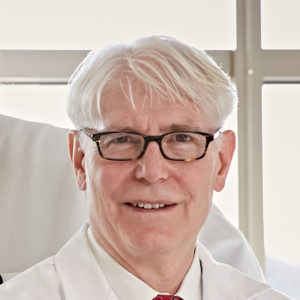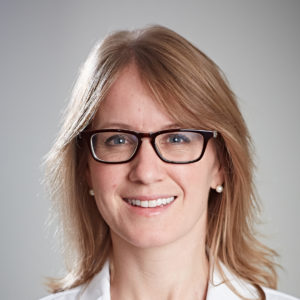Bruce M. Boman, M.D., Ph.D. — Director, Cancer Genetics and Stem Cell Biology

Renowned for his work in colorectal cancer, and a cancer survivor himself since 2000, Bruce M. Boman, M.D., Ph.D., is an attending physician and director for Cancer Genetics and Stem Cell Biology for Christiana Care’s Helen F. Graham Cancer Center & Research Institute. He also represents the Graham Cancer Center as a scientist with the Center for Translational Cancer Research.
Dr. Boman’s long term career goal is to identify cancer stem cell based mechanisms that will lead to the development of new more effective, potentially even curative or preventive, treatments for cancer. Based on the emerging paradigm in oncology, effective agents will need to target cancer stem cells, which are the cells that become overpopulated during tumorigenesis and drive tumor growth. Dr. Bomann demonstrated that APC, via TCF4, regulates survivin expression and that APC, when mutant, leads to survivin overexpression and contributes to the stem cell overpopulation during colon tumorigenesis. Dr. Boman’s work also showed that survivin expression is upregulated in ApcMin/+ mice in association with Tcf4 activation and intestinal tumorigenesis. In addition, Dr. Boman’s work reported that stem cell overproduction results from increased symmetric stem cell division. Our recent research findings led to the discovery that ALDH1 is a marker for colonic stem cells and allows tracking of stem cell overpopulation during colon cancer development and isolation of cancer stem cells.
Dr. Boman’s overall hypothesis is “APC mutations that drive growth of colon cancers do so by causing stem cell overpopulation.” Dr. Boman recently published a novel model that provides a mechanism that explains how APC regulates crypt fission and, when mutant, how APC leads to abnormal crypt fission, colonic stem cell overpopulation and adenoma development.
Dr. Boman has been involved in research on APC and GI tumorigenesis for over 20 years and have vast expertise in quantitative immunohistochemical mapping of cell populations in mouse and human intestinal crypts as well as efficacy studies of chemopreventive agents using Apc Min mice. While Dr. Boman has significant experience as a laboratory chief investigating the molecular and cellular etiology of colon cancer, he is also a clinical investigator and has been integrally involved in translational efforts at all levels to advance the discoveries of cancer research to the benefit of oncology patients.
Dr. Boman served as the national princiapl investigator of the NSABP colon cancer statin prevention trial to investigate the efficacy of rosuvastatin in preventing adenomas. In addition, he has made numerous contributions to the field through publications, presentations, as a patient advocate, and service as a member on many NIH committees and study sections.
Lindsay B. Romak, M.D. — Radiation Oncologist

Dr. Romak graduated from Dartmouth College with Honors in Biochemistry and Molecular Biology in 2005. She earned her medical degree from the University of Connecticut School of Medicine with multiple honors, including the Dean’s Award for Academic Excellence and having earned First Place in the Dean’s Symposium on Patient Safety and Quality Improvement. Dr. Romak completed a transitional internship through Yale University at the Hospital of Saint Raphael, in New Haven, CT, where she was named Intern of the Year. She subsequently completed residency training in radiation oncology at the Mayo Clinic in Rochester, Minnesota, where she served as Chief Resident in 2014-2015.
Dr. Romak has authored numerous peer-reviewed articles and abstracts and has presented at many professional oncology and brachytherapy symposia. Her research and clinical interests include treatment of gastrointestinal, gynecologic, breast and thoracic malignancies. She is a member of multiple professional societies and organizations including the American Brachytherapy Society, the American Society for Radiation Oncology and the Particle Therapy Co-Operative Group.